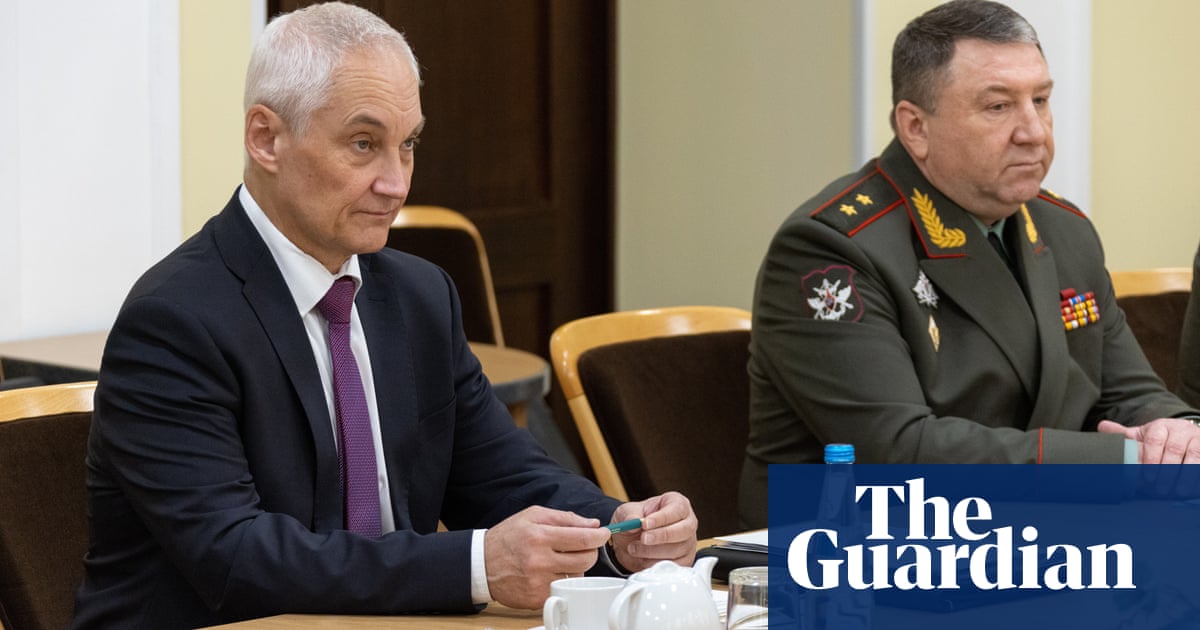In the weeks since Vladimir Putin sacked his longtime defence minister Sergei Shoigu, Russia’s FSB security service has pursued a series of high-level corruption cases against a deputy minister and department heads in what many insiders are now calling a purge in the defence ministry.
Andrei Belousov, the technocrat economist appointed to replace Shoigu, has a mandate to reduce corruption in the defence ministry and streamline military production for a long war against Ukraine that could largely be decided by industrial output.
But former defence and Kremlin officials, ex-officers and foreign observers have said it was likely the exit of Shoigu and loss of his protection that has allowed the FSB, the Russian security department responsible for internal investigations, to take down powerful officials in a power struggle that could have knock-on effects for how Russia fights the war in Ukraine.
“The FSB finally got their teeth in the defence ministry and general staff,” said Capt John Foreman, the UK’s former defence attache to Moscow, who said he believed the arrests could continue after “Putin’s patience had finally snapped”.
“Shoigu and Gerasimov provided a buffer, but now Putin decided he had to do something,” he said. “Shoigu kept the FSB largely away from the ministry throughout his tenure, there were very few arrests. Once the FSB has their teeth in you, who knows how far they will go.”
Throughout the war in Ukraine, Shoigu and Gersasimov have come under fire from pro-war advocates for the military’s setbacks and their failure to eradicate pervasive corruption within the armed forces. Last summer, this dissatisfaction reached its peak when Yevgeny Prigozhin, the founder of the Wagner paramilitary group, initiated an unsuccessful rebellion against the military’s leaders.
Interagency rivalries run deep in Russia, and Shoigu’s ouster may have given investigators in the FSB and investigative committee an opportunity to brush off criminal cases against the top brass in an effort to seek promotions and praise.
“It’s the dream of any investigator to put a real live deputy minister of defence in prison, it’s cool, it’s the dream of a lifetime,” said one former Kremlin official. “You get new epaulettes for that, a promotion, some kind of award. You can earn a reputation for that.”
In the case of high-level prosecutions, the official said, Putin would probably be informed before an arrest was sought. But, the official added, he said it was unlikely the corruption cases were being initiated by the Kremlin itself.
In the span of a month, four top defence officials were arrested on corruption charges, marking the most significant crackdown in the defence ministry in years. The purge began on 23 April with the shock arrest of the veteran deputy defence minister Timur Ivanov for suspected bribe-taking.
Addressing the recent series of arrests, the Kremlin on Thursday denied any suggestion of a crackdown within the defence ministry.
“The fight against corruption is consistent work,” the Kremlin spokesperson Dmitry Peskov told reporters on Thursday. “It is not a campaign, it is constantly ongoing work.”
Ivanov was a long-term confidant and protege of Sergei Shoigu. His detention is believed to have laid the groundwork for Shoigu’s dismissal, who was subsequently replaced as defence minister by Belousov.
In the weeks that followed, additional high-ranking officials were detained. These included Yuri Kuznetsov, the head of the ministry’s personnel department, and Vadim Shamarin, the head of the communications department of the Russian general staff. Hours after Shamarin’s arrest on Thursday, Russia’s investigative committee also reported detaining another defence ministry official – Vladimir Verteletsky, who headed a division in the state defence procurement department of the ministry.
While the Kremlin announced earlier this month that Russia’s top general, Valery Gerasimov, the chief of the general staff, would retain his position, the arrest of Shamarin, a direct deputy of Gerasimov, could weaken the general’s standing within the military hierarchy.
“The probability of Gerasimov’s dismissal has gone up. I would sell my shares in him right now,” said Foreman.
A former defence official said the arrests showed that the balance of power had swung in favour of Russia’s security services, while its military appears in disarray.
“The FSB’s department of counterintelligence operations (1st division) is becoming increasingly powerful. They currently hold all the cards and are tightening the screws,” said the official, who worked closely with Ivanov and Shoigu.
“It is not that Belousov’s arrival led to the purges, but the departure of Shoigu and his strongmen resource that enabled the arrest,” the official continued. “Shoigu in the end was a silovik [member of the security elite] and had their backing.”
Russian prosecutors have also gone after a senior general best known for his criticism of Shoigu and Gerasimov.
Maj Gen Ivan Popov, who commanded the 58th Combined Arms force, said last summer that he had been fired after he brought up problems on the battlefield, including the lack of counter-battery fire, and deaths and injuries the army was suffering from Ukrainian attacks. Popov, who Russian media said stood accused of stealing 100m roubles (£868,569) of metal, was arrested on Tuesday and placed in a pre-detention facility.
Gleb Irisov, a former Russian air force lieutenant who left the military in 2020, said he had spoken with an FSB source before the arrests who told him that the purge in the defence ministry would be prompted mainly by its failures in Ukraine.
“Under Sergei Shoigu, the defence ministry became heavily influenced by his personal network,” said Irisov. “From senior commanders to lower staff, key positions were filled with Shoigu’s picks – friends or friends of friends. He even created numerous deputy positions specifically for his allies.”
Those have included a reported mistress of Sergei Shoigu’s who headed companies that earned millions of pounds from contracts with the defence ministry.
Irisov said he regularly discovered substandard equipment in the military, including lightbulbs that melted at supersonic speeds while flying Russia’s modern Su-35 air-defence fighter, as well as shoddy trucks and air defence systems unable to shoot down modern drones. He said in part their deficiencies were the result of corruption under Shoigu.
“The overall quality of the military suffered because funds were routinely embezzled,” he said. “Military exercises often existed only on paper, as the allocated money was siphoned off.”

Emily Foster is a globe-trotting journalist based in the UK. Her articles offer readers a global perspective on international events, exploring complex geopolitical issues and providing a nuanced view of the world’s most pressing challenges.








